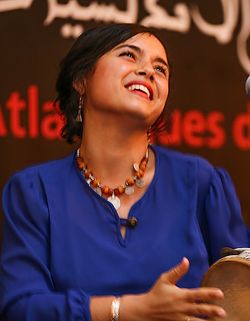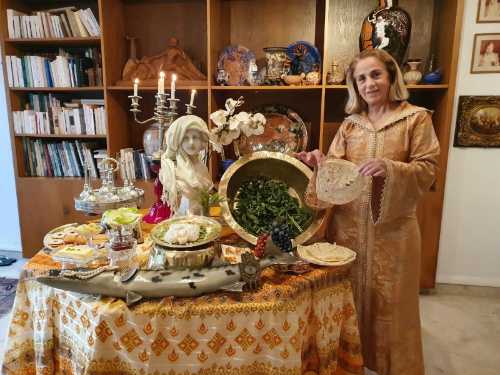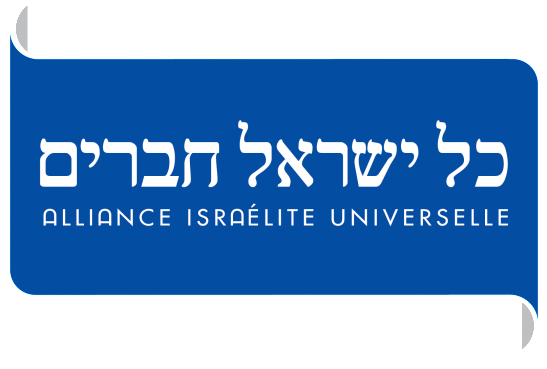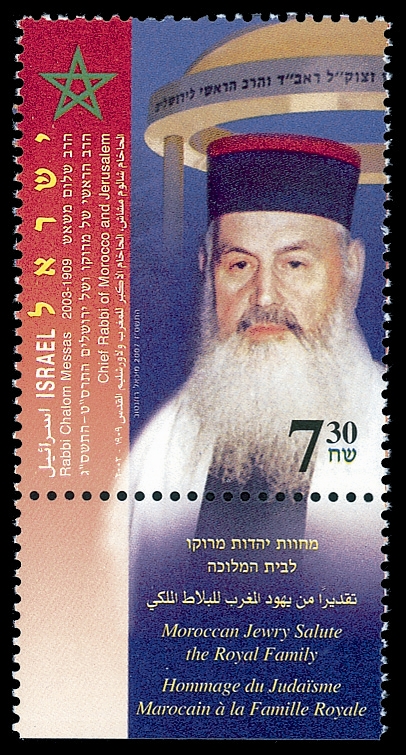The Meaning of Mimouna!

In Memory of the American Sephardi Federation’s Vice President Florence Amzallag-Tatistcheff, A”H, a proud and elegant Moroccan Lady, a force of character who championed the classic Moroccan Sephardic tradition, the vibrancy of the Judeo-Moroccan heritage, and the cause of coexistence through her early and invaluable support of Association Mimouna ~ Elmehdi Boudra (President, Association Mimouna) and Jason Guberman (Executive Director, American Sephardi Federation).
Click here to dedicate a future issue in honor or memory of a loved one

The American Sephardi Federation’s Sephardi Ideas Monthly is a continuing series of essays and interviews from the rich, multi-dimensional world of Sephardi thought and culture that is delivered to your inbox every month.
In honor of Passover, we are once again sharing a Jewish Ideas Daily article by the ASF’s Director of Publications, Dr. Aryeh Tepper, introducing the delightfully festive, post-Passover celebration of “Mimouna!”
What’s the story behind Mimouna, the Moroccan-Jewish holiday “that is popularly observed by picnicking, barbecuing, and consuming moufletas (sweet North African pancakes)?” Writes Tepper:
No one really knows. First documented in the 18th century, it was, according to one theory, originally intended to persuade a supposedly Jewish demon named Maimun to let the crops flourish. Another theory links Mimouna to the Hebrew word emunah, meaning faith or, to be precise, faith in the ultimate redemption; after all, tradition teaches that Israel will be redeemed in the Hebrew month of Nissan, the month when Passover marks the original redemption from Egypt. Others have offered anthropological and historical explanations.
But historical research is one thing, while lived experience is another. Outside of Israel, Mimouna is starting to draw attention, while in Israel, Mimouna has become an officially recognized holiday that’s celebrated by, well, pretty much everyone.

What can we learn from Mimouna’s surging popularity?
From one perspective, the day’s popularity reflects the degree to which the Moroccan Jewish experience has been ‘nationalized.’ From another, it reflects the degree to which a Jewish cultural practice rooted in a land of exile has survived under conditions of national sovereignty. And more than survived—flourished.
But Mimouna isn’t the only custom connected to the exile that has managed to flourish under new, national conditions. Tepper notes how a continuity of historical memory connected to the exile also animates:
… the singing of bakkashot, a wintertime liturgical rite common throughout North Africa and parts of the Levant; in it, Jews meet in the synagogue from 3:00 to 6:00 on winter Sabbath mornings to sing sacred Hebrew poems in the style of Arab-Muslim ‘art music.’
You can find Moroccan Jews who zealously maintain this tradition in every major Israeli city, with the added twist that now many non-Moroccans participate as well.
All that said, the continuation of Moroccan-Jewish traditions rooted in exilic practices, like Mimouna, depended upon the capacity to survive homogenizing influences from two different directions: the socialist-inspired pressure of nation-building at the state’s founding, and the rabbinically-inspired pressure to conform to a uniform “Sephardi” identity, beginning in the 1980s. But now that Mimouna has, indeed, come through, the holiday’s popularity reflects a more mature notion of national identity. Today, as Tepper notes:
Israelis are open to absorbing Jewish traditions that in the strict sense, but only in the strict sense, are not their own.
Sephardi Ideas Monthly is very happy to introduce our readers to Israel’s nationally celebrated Moroccan holiday, with Dr. Aryeh Tepper’s stimulating and entertaining article, “Mimouna!”
~~~~~~~
Special Feature: Virtual Mimouna 2020

On 12 April 2020, Association Mimouna, the American Sephardi Federation, the Muslim American Leadership Alliance (MALA), and Moroccan Americans in New York (MANY) hosted Virtual Mimouna 2020, dedicated in memory of ASF Vice President and Association Mimouna Advisory Board Member Florence Amzallag-Tatistcheff, A”H.
“Mimouna” is a unique Moroccan Jewish celebration of liberty and community. Moroccan Jews would invite their Muslim neighbors to join their post-Passover festivities and Moroccan Muslims would reply with gestures of goodwill, solidarity, and a shared craving for carbs. On account of the COVID-19 pandemic, we brought the tradition online, virtually traveling from house to house, to the homes of special guests in Morocco, Israel, the United States, United Kingdom, Canada, and France.
Virtual Mimouna 2020 featured:
> Enrico Macias in Paris
>Neta ElKayam & Amit Hai Cohen in Jerusalem
> Mimouna tables in Casablanca (by Maguy Kakon) and Rabat (by Veronique Amzallagh)
> ASF Broome & Allen Fellow Dr. Vanessa Paloma Duncan-Elbaz
> President of the Jewish Community of Marrakech Jacky Kadoch
> Founder and President of Association Mimouna Elmehdi Boudra
>Vice President of Association Mimouna Laziza Dalil in Marrakech
> Rabbi Gad Bouskila of Netivot Israel in Brooklyn
> Mufleta cooking demonstration by ASF Broome & Allen Fellow Dr. Hélène Jawhara-Piñer
> Instrumental Andalusian music by Salah Eddine Mansouri in Rabat
We are especially grateful for the exclusive participation in Virtual Mimouna 2020 of Moroccan Jewish community members during what was a difficult time last year.
~~~~~~~

The Monthly Sage החכם החודשי
Hakham Chalom (Shalom) Messas

(Photo courtesy of the Israel Philatelic Federation)
The sage for the month of March, 2021, is Hakham Chalom (Shalom) Messas (1909-2003).
Born in the city of Meknes, Morocco, to an illustrious family of rabbinic scholars, young Chalom began studying Torah with Rabbi Yitzhak Assebag. Hakham Chalom then published his first book on Halakha, Memizrach Shemesh, in 1928 at age 17. In his Introduction to the work, R’ Chalom testifies to his whole-hearted immersion in the world of Torah study: “…during my boyhood days, I did not know what a coin even looked like, and all the wealth in the world seemed worthless when compared to the passion of studying the holy Torah.”
R’ Chalom soon married Jamila, and the couple gave birth to two sons, David and Abraham. R’ Chalom’s rabbinic career commenced in 1944 when he founded the Keter Torah Yeshiva at Meknes. In 1949, R’ Chalom moved to Casablanca, where he served as judge. He was then elected head of Casablanca’s Rabbinic Court in 1962, and subsequently was appointed to the position of Morocco’s Chief Rabbi. King Hassan II deeply respected R’ Chalom, even bowing when the Jewish scholar and leader would bless him.
In 1978, R’ Chalom made Aliyah to Israel and assumed the position of Jerusalem’s Chief Rabbi. He passed away on 10 Nissan 5763 (2003) and was buried in Jerusalem’s Har HaMenuhot cemetery.
Hakham Chalom Messas’ many books include legal works and responsa, as well as sermons on the Torah. In the following passage, Hakham Chalom teaches that even if a person is a Torah scholar, He is not beloved by God if he lacks humility:
Our Sages, of blessed memory, instruct us to begin with the Book of Leviticus [Vayikra], specifically, in teaching schoolchildren, so that the issue of humility should be learned first, for it is required for Torah study. A person lacking humility, even if they are a great Torah scholar, is not beloved by the Almighty. That is why there is a small aleph in the word Vayikra: so that pupils may ask why, and teachers can explain, as above, concerning our Master Moses’ humility, and that the notion reach the child’s mind. This is a fundamental principle in Torah.
~~~~~~~

By Rabbi Dr. Marc D. Angel
This unique Sephardic Passover Haggadah will be valued by Sephardim and Ashkenazim alike. Hakham Rabbi Angel provides a new, readable translation of the classic Haggadah text. Added to it are some selections in Judeo-Spanish as well as the popular “Bendigamos” blessing after meals.
This special edition of the Haggadah includes a running commentary, drawn from the teachings of Sephardic sages through out the generations, with insights from such Sephardic luminaries as Rabbis Moses Maimonides, Yitzhak Abravanel, Hayyim Y. D. Azulai, Benzion Uziel, Hayyim David Halevy and many others, ancient and modern. The Haggadah also includes a number of Sephardic customs which will enrich anyone’s Passover Seder.
Exploring Sephardic Customs and Traditions
By Hakham R’Marc D. Angel, Ph.D
Over the centuries, Jewish communities throughout the world adopted customs that enhanced and deepened their religious observances. These customs, or minhagim, became powerful elements in the religious consciousness of the Jewish people. It is important to recognize that minhagim are manifestations of a religious worldview, a philosophy of life. They are not merely quaint or picturesque practices, but expressions of a community’s way of enhancing the religious experience. A valuable resource for Sephardim and Ashkenazim alike.
~~~~~~~
Upcoming Events or Opportunities
Lower Manhattan Historical Association presents:
Third Annual Ceremony Honoring the 293th Anniversary of the Consecration of the first Synagogue in North America
THE GERSHOM MENDES SEIXAS RELIGIOUS FREEDOM AWARD
14 April at 12:00PM EST
26 South William Street co-named ‘Mill Street Synagogue & Seixas Way’

Opening Remarks
Ambrose Madison Richardson President, Lower Manhattan Historical Association
Reverend Zachary Edinger Sexton, Congregation Shearith Israel
Rabbi Nissi Eber, The Jewish Learning Experience
Jack Kliger, President & CEO Museum of Jewish Heritage – A Living Memorial to the Holocaust
Presentation of the GERSHOM MENDES SEIXAS RELIGIOUS FREEDOM AWARD TO Ambrose Madison Richardson, President, Lower Manhattan Historical Association
Bill Tingling Founder & CEO of the Tour for Tolerance
Joseph Seligman, Philip Peyton & the Black Jewish Alliance
James S. Kaplan Co-Founder & Chair, Lower Manhattan Historical Association
Reading of the Letter from George Washington to the Hebrew Congregation Newport, R.I, August 18, 1790

Sponsoring Organizations:
Lower Manhattan Historical Association, Sons of the Revolution in the State of New York, Inc. and Its Fraunces Tavern® Museum, Chinatown Partnership, Chinatown Business Improvement District, Financial District Neighborhood Association, The Institute of History Archeology & Education, Financial District, American Sephardi Federation, The Alliance for Downtown New York, The New York Board of Rabbis, The Museum of Jewish Heritage – A Living Memorial to the Holocaust, The Temple of Universal Judaism, The Jewish Learning Experience, Bowling Green Association.
~~~~~~~
The Belzberg Program in Israel Studies at the University of Calgary and the Schusterman Center for Israel Studies at Brandeis University. With the collaboration of the American Sefardi Federation, Centro Sefarad Israel, and the International Network for Jewish Thought present:
Sephardi Modernities Seminar Series, 2023
Join us as we explore the relationship between our narratives about the past and the future to which we aspire. The ways in which scholars approach the stories, events, characters, and historical processes of the Sephardi/Levantine past are inevitably guided by values, by their moral and political beliefs. Which elements of the past do they strive to preserve, reclaim and grant continuity? What are they trying to say about a potential future? Which stories become part of canonized history, and which ones are dismissed as mere anecdotes? Which theoretical, social, political, and cultural frameworks do they wrestle with, and which do they seek to advance?
On Zoom
(Registration is required for each session)
18 April at 12:00PM EST
‘Modernity’ and ‘Tradition’ on the Move: Spanish Moroccan Jews and their Diasporas
Aviad Moreno, Ben-Gurion University of the Negev, in conversation with Angy Cohen, University of Calgary
Sign-up Now!
9 May at 12:00PM EST
Sephardi Musical Modernities: Listening to the Past in the Future
Edwin Seroussi, Hebrew University of Jerusalem
Yair Dalal, Composer, violinist, oud player, singer, and teacher
Sign-up Now!

Throughout this year’s series we will discuss the future invoked by each way of looking at the past, the political agendas of historical research, and the values that unavoidably guide scholastic inquiry. Topics include the transmission of narratives among collectives and among researchers, ownership of archives, encounters with the past, the academic legitimacy of certain topics and collectives, vehicles of memory (music, oral history, proverbs, etc.) and the construction of historical narratives.
Organized by Dr. Angy Cohen, Inaugural Hy and Jenny Belzberg Postdoctoral Associate in Israel Studies, Department of Anthropology and Archaeology at the University of Calgary, and Dr. Yuval Evri, Assistant Professor of Near Eastern and Judaic Studies on the Marash and Ocuin Chair in Ottoman, Mizrahi, and Sephardic Jewish Studies, Brandeis University.
~~~~~~~
The 25th New York Sephardic Jewish Film Festival Starts in One Month!
To celebrate its 25th Anniversary, the NYSJFF will play both at the ASF – Center for Jewish History & via our new online platform for the first time!
7- 11 May 2023
ASF – Center for Jewish History
15 West 16th Street
New York City
14 -18 May 2023
Online platform: nysjff.eventive.org
This 25th edition of the NYSJFF is dedicated to Ike, Molly and Steven Elias
The NYSJFF not only returns with outstanding films of all genres exploring the beauty, diversity, and vitality of Greater Sephardic Jewish communities’ culture and identity across the world, but also welcomes a new host and Artistic Director, the decorated filmmaker, writer, director, and Pomegranate Award recipient, Yemenite-Israeli born Na’ama Keha.

Film and VIP Festival Passes are on sale now! Don’t miss the Special Passover Sale, which expires on Friday, 14 April, @ 5PM ET
VIP Festival Pass – $$500 until 14 April; $600 After
(includes Opening Night, Closing Night, All Screenings at the ASF – Center for Jewish History and Parties)
Film Pass – $200 until 14 April; $225 After
(includes Closing Night and All Screenings at the ASF – Center for Jewish History):
All Access Online – $225
(includes 15 films selected from the Festival and online exclusives streaming from Sunday, 14 May 14 to Thursday, 18 May)
Carefully curated to delight cinema lovers of all ages and communities, the new line-up includes 14 films in theatre and 15 Festival favorites and web exclusives on the streaming platform. We are offering a unique blend of independent films mixing various styles and origins, including critically acclaimed movies, World, US, and New York premières, and a retrospective of NYSJFF’s best films from the past 25 years.
To mark Israel’s 75th Anniversary, the Festival focuses on Israeli Sephardic themes and pays tribute to Ronit Elkabetz, the actress, filmmaker, and first Pomegranate Award Winner. Audiences will get to (re) discover her work and see — playing for the first time in North America — the 2022 documentary JE T’AIME RONIT ELKABETZ about her life and her use of fashion to make social statements.
STAY TUNED for the complete list of films to be announced soon, along with the short film selections, filmmaker appearances and the highly anticipated names of this year’s Pomegranate Award Honorees!
The Pomegranate Award, sculpted by renowned Baghdad-born artist Oded Halahmy, recognizes extraordinary achievements in the arts. Past recipients include Albert Memmi, Enrico Macias, André Azoulay, Neta Elkayam, Lisa Azuelos, Saïd Ben Saïd, Elie Tahari, Caroline Aaron, Ema Shah, Sassoon Gabay, André Aciman, Amir Arison, and Lanie Kazan.
The NYSJFF provides a range of opportunities for donors looking to support the American Sephardi Federation’s year-round preservation, education, and empowerment mission.
Your contribution will help us continue to promote the richness of Sephardic culture and to continue to provide representation with results for American Sephardi communities. Haj Sameyah!
Discuss Sponsorship or Advertising: Yves@AmericanSephardi.org
Email Inquires: info@AmericanSephardi.org
~~~~~~~
YIVO Institute for Jewish Research, in partnership with the American Society for Jewish Music, American Sephardi Federation presents:
Babylon: Ghetto, Renaissance, and Modern Oblivion
Film Screening
Followed by a Q&A with director Jessica Gould
The award-winning film, considers the resonance of Psalm 137 (By the Waters of Babylon) through the music of two ghettoized peoples – Italian Jews of Mantua during the period of the Counter-Reformation, and African Americans before, during, and after the Harlem Renaissance.
Wednesday, 17 May at 7:30PM EST
@the Center for Jewish History
(Complimentary RSVP)
Sign-up Now!

About the film:
A 29-minute voyage through four centuries, Babylon confronts vital questions about minority musicians and their foundational roles in the music we enjoy today. Who was celebrated? Who was erased? Who was invited to the party and who was left out in the cold? Whose genius was attributed to someone else? Who contributed the most while remaining on the sidelines of history? And most importantly, why does it keep happening?
Ezra Knight narrates a script that interweaves works by Italian-Jewish composer Salomone Rossi (1570 – 1630) and contemporary American Brandon Waddles (1988 –). Additional Rossi works include performances by the Bacchus Consort, Voices of Music, and soprano Jessica Gould in collaboration with lutenist Lucas Harris. Also featuring the groundbreaking Kaleidoscope Vocal Ensemble, other musical selections include historical recordings by Ma Rainey, Sister Rosetta Tharpe, Big Mama Thornton, The Fisk Jubilee Singers, as well as two luminaries in contemporary West African music – Kevin Nathaniel Hylton and Yacouba Sissoko.
About the speaker:
Jessica Gould is a director, writer, and soprano who continues to enjoy a formidable reception for her maiden film project, Babylon: Ghetto, Renaissance, and Modern Oblivion, on the international film festival circuit. Having become a filmmaker by virtue of the pandemic out of a need to continue presenting classical and early music through the prism of history in the absence of live performance, Ms. Gould’s ever expanding laurels include 90 awards and counting from festivals across the globe. As the Founder and Artistic Director of Salon/Sanctuary Concerts, based in New York City, her original projects have received grants from numerous foundations and institutions, generous support which has enabled the series to blossom into one of the more significant presenters of historical performance in New York City and beyond.
~~~~~~~
Kehila Kedosha Janina Synagogue and Museum presents:
Greek Jewish Festival
Sunday, 21 May 12:00-6:00PM EST
(280 Broome Street, Lower East Side, NYC)
Join the Greek Jewish Festival as we celebrate the unique Romaniote and Sephardic heritage of the Jews of Greece!
Experience a feast for the senses including authentic kosher Greek foods and homemade Greek pastries, traditional Greek dancing and live Greek and Sephardic music, an outdoor marketplace full of vendors, arts and educational activities for kids, Sephardic cooking demonstrations, and much more!
The ASF is once again proud to be a Festival Sponsor.
Learn more at www.GreekJewishFestival.com

~~~~~~~
ASF Broome & Allen & ADL Collaborative for Change Fellow Isaac de Castro presents:
Entre Diasporas: Telling the Latin-American Jewish story. Contando la historia judía latinoamericana

Tell your story. Cuenta tu historia.
We’re looking for first-generation Latino Jews in the United States who immigrated because of political and social turmoil. Jews of Sephardic descent from Colombia, Cuba, and Venezuela that now reside in the Miami area will be given priority, but others are welcome to apply as well.
Fill out this form to be considered as an interviewee for this project. After you’ve submitted, we will be in touch promptly to set up a preliminary phone call.
Click here for more information.